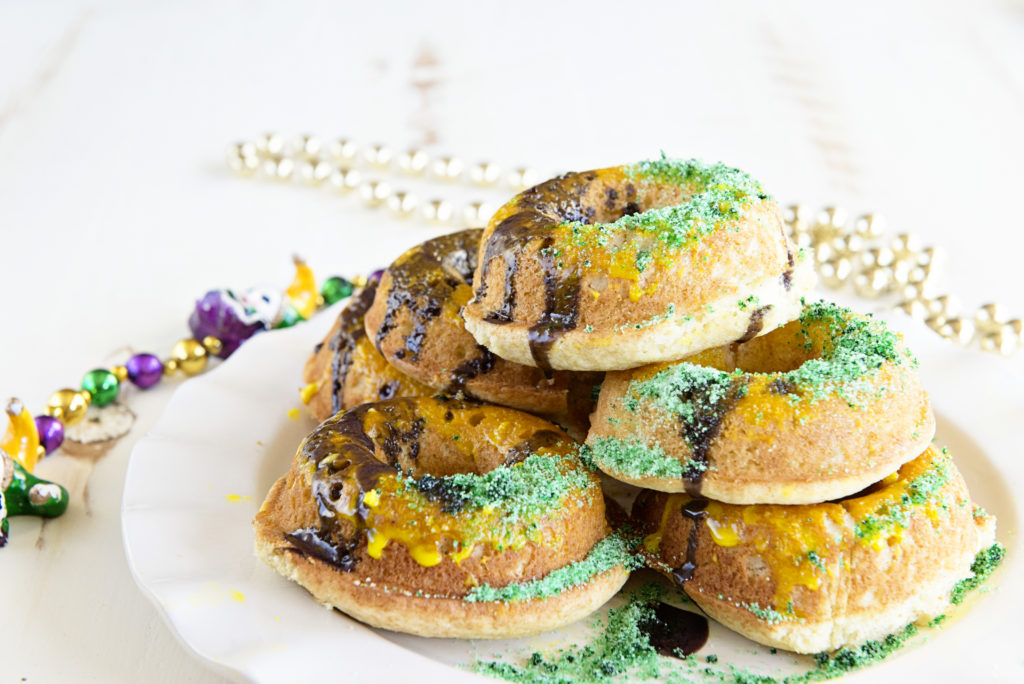
As any Michigander will tell you, whether or not you choose to observe the Lenten season, Mardi Gras is a date marked on your calendar for one main reason: pączki. But this Mardi Gras tradition is somewhat unique to Michigan.
Mardi Gras, the French phrase that literally means “Fat Tuesday,” is the name for the Tuesday before Ash Wednesday, the beginning of the season of Lent. The day is celebrated in a variety of ways depending on where you’re from, but in general, the theme is a celebration of culture, and most importantly, food.
Senior Meghan Perks from Louisiana described the kind of festivities that take place at a typical New Orleans Mardi Gras.
“It’s a really cool time,” Perks said. “There are always people listening to Cajun music and dancing, and it’s really fun to just see groups of people gathering together, eating jambalaya or gumbo, and obviously King Cake, and just watching people have a good time together right before Lent starts.”
King Cake, a sweet bread frosted in purple, green, and gold, is a traditional Mardi Gras treat. The Mardi Gras season, however, is a lot longer than just Fat Tuesday in New Orleans.
“I’ve been going to Mardi Gras since I was a wee babe,” Perks said. “It starts on January 6, technically, which is the Epiphany, when the Wise Men found Jesus, and that’s where we get King Cakes from. From that point on, all the parades begin.”
The festivities continue to increase in the weeks leading up to Mardi Gras weekend, when the celebration is at its peak. Perks noted how the festivities take a pause before beginning again on Monday and Tuesday.
“There are never any parades on Sunday, which is really cool, I think, and gives people time to rest after eating so much food and drinking so much alcohol,” Perks said, laughing.
Though he won’t be hosting a month-long celebration, Patrick Kander, the executive chef for Bon Appétit Management Company, said the dining hall will be offering a few traditional Louisiana dishes, including classic gumbo.
“For lunch, we’re going to do a chicken sausage and shrimp jambalaya, and some stewed okra, zucchini, and tomatoes,” Kander said. “At Passport, we’re going to offer a fried shrimp Po’Boy with red beans and rice, and sauteed mustard greens.”
He added that Creole food is one of his favorite styles to cook.
“It’s very deeply rooted in their culture,” Kander said. “I’m actually going to New Orleans again in a few weeks, and it’s very rich in history. It’s just a lot of really, really wonderful food, very much comfort food.”
Bon Appétit will also be representing traditional Michigan culture, with an array of pączki being offered starting at mid-breakfast until they run out.
Perks said she’d never even heard of pączki before coming to Hillsdale College, but freshman Phoebe Fink from Ypsilanti, Mich. swears it is not Fat Tuesday until she has had one of these jelly-filled Polish doughnuts.
“Every year on Fat Tuesday, most of Michigan consumes basically their own bodyweight in pączki. Mostly we just get them at grocery stores,” Fink said, adding that Kroger is always well stocked at least a week in advance of the holiday. “Last year, my family and I drove to the Polish district of Detroit, a little city called Hamtramck, and there are a bunch of Polish bakeries there that fill up with pączki before Fat Tuesday. So we went there and bought about three dozen, and they were delectable.”
Fink’s family is not the only one obsessed with the Polish treat, however, and Fink said it’s not unusual for all the pączki to be gone by the time Fat Tuesday itself rolls around.
For Perks, it’s all about the King Cake. She said that last year, Bon Appétit offered this traditional Mardi Gras sweet, too.
“Last year for Mardi Gras, they had King Cake in the dining hall, and they called it King Bread. It made me kind of cry on the inside,” Perks said, joking. “People hardly know anything about Louisiana. I guess it’s a crazy place, and just seems very bizarre from the outside. It’s kind of bizarre from the inside.”
But she doesn’t let this stop her from sharing some King Cakes of her own among her friends on the days before Lent. She said she enjoys telling others about Mardi Gras, and though she joked that Michigan culture was missing out, she acknowledged that each tradition had its merit.
“I always grieve quietly because people don’t know what King Cake is!” Perks said. “That’s the real thing! But also, the pączki are the real thing for people up here, and I’ve never experienced them, so maybe they grieve for me as well.”

